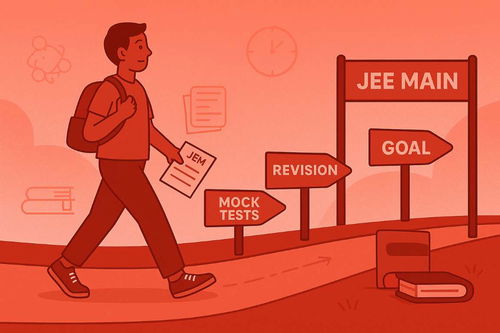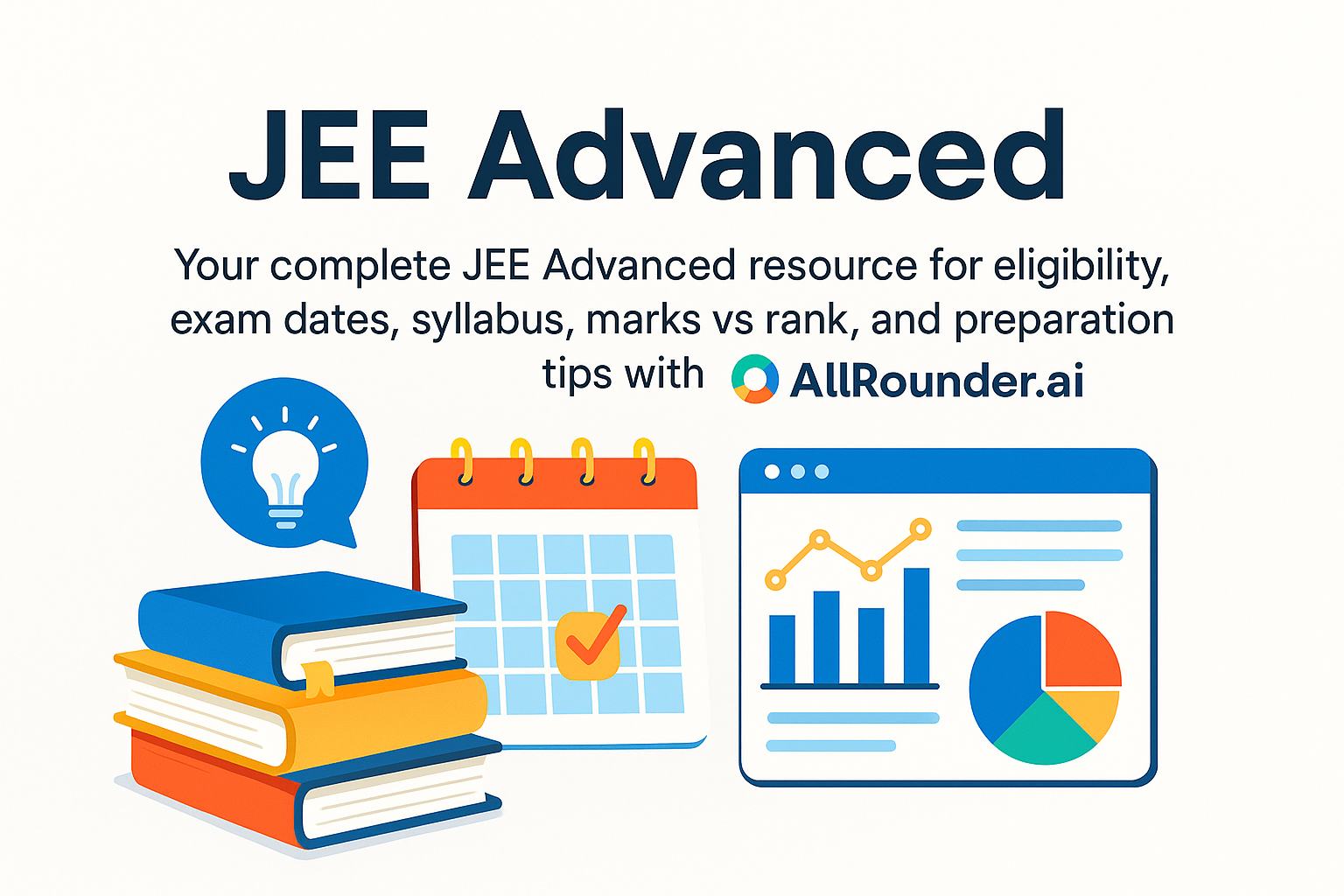Professional Courses
Industry-relevant training in Business, Technology, and Design
Categories
Interactive Games
Fun games to boost memory, math, typing, and English skills
Typing
Memory
Math
English Adventures
Knowledge
JEE Main Chapter-Wise Weightage for Smart Prep

Cracking JEE Main is about more than just hard work. It's about working smart. With a syllabus that includes over 90 chapters across Physics, Chemistry, and Maths, students often feel overwhelmed trying to study everything equally. That’s why knowing the chapter-wise weightage is a game-changer.
This blog will break down the chapter-wise weightage for each subject and explain how you can use it to create a high-impact, smart preparation strategy. You’ll also find tips, links to helpful resources, and actionable advice you can use starting today.
Why Chapter-Wise Weightage Strategy Works
Understanding chapter-wise weightage helps you:
- Prioritise your preparation
- Allocate your time wisely
- Boost your confidence in high-weightage topics
- Minimise time wasted on low-return chapters
- Improve your overall score with focused revision
Let’s start with the subject that many students find challenging yet rewarding: Physics.
Physics Chapter-Wise Weightage
Physics is a subject where understanding the concepts and practising numerical problems go hand in hand. Here's how the chapters generally contribute:
Mechanics (Class 11) – Approx 25%
- Kinematics
- Laws of Motion
- Work, Energy and Power
- Rotational Motion
- Gravitation
Thermodynamics and Kinetic Theory – Approx 10%
- Thermodynamics
- Kinetic Theory of Gases
Oscillations and Waves – Approx 10%
- Simple Harmonic Motion
- Sound and Wave Motion
Electricity and Magnetism – Approx 25%
- Electrostatics
- Current Electricity
- Magnetic Effects of Current
- Electromagnetic Induction
Optics – Approx 10%
- Ray Optics
- Wave Optics
Modern Physics – Approx 15%
- Dual Nature of Matter
- Atoms and Nuclei
- Semiconductor Electronics
Experimental Physics – Approx 5%
- Units and Measurements
- Instrumentation and Error Analysis
Tips for Physics Preparation
- Start your revision with high-weight chapters like Mechanics and Electrodynamics
- Maintain a formula sheet and revise weekly
- Solve PYQs by chapter
- Understand derivations rather than memorising them
Resources:
Allrounder.ai Class 11 Physics
Allrounder.ai Class 12 Physics
Chemistry Chapter-Wise Weightage
Chemistry is often the most scoring subject for JEE Main. Here’s how the chapters are distributed:
Physical Chemistry – Approx 30%
Class 11
- Mole Concept
- Thermodynamics
- Equilibrium
Class 12
- Solutions
- Electrochemistry
- Chemical Kinetics
Inorganic Chemistry – Approx 30%
Class 11
- Periodic Table
- s-Block Elements
- Hydrogen
Class 12
- p-Block Elements
- d- and f-Block Elements
- Coordination Compounds
Organic Chemistry – Approx 40%
Class 11
- General Organic Chemistry
- Hydrocarbons
Class 12
- Haloalkanes and Haloarenes
- Alcohols, Phenols, and Ethers
- Aldehydes and Ketones
- Carboxylic Acids and Amines
- Biomolecules and Polymers
Tips for Chemistry Preparation
- Stick to NCERT for Inorganic Chemistry
- Build reaction mechanism flowcharts for Organic
- Focus on numerical solving in Physical Chemistry
- Practice memory recall for p-block
Resources:
Class 11 Chemistry
Class 12 Chemistry
Mathematics Chapter-Wise Weightage
Maths requires both speed and accuracy. Understanding chapter weightage helps improve time efficiency.
Algebra – Approx 35%
- Quadratic Equations
- Sequences and Series
- Complex Numbers
- Binomial Theorem
- Probability
- Sets, Relations, and Functions
Calculus – Approx 30%
- Limits and Continuity
- Differentiation
- Applications of Derivatives
- Integration
- Differential Equations
Coordinate Geometry and Vectors – Approx 20%
- Straight Lines
- Circles
- Parabola
- Ellipse
- Hyperbola
- 3D Geometry
- Vectors
Trigonometry and Misc – Approx 15%
- Trigonometric Identities
- Inverse Trigonometric Functions
- Mathematical Reasoning
- Statistics and Probability
- Determinants and Matrices
Tips for Maths Preparation
- Keep a dedicated notebook for formulas
- Mix difficult and easy chapters in your study routine
- Practice under timed conditions
- Analyse every mock test for error patterns
Resources:
Math Class 11
Math Class 12
How to Use This Data
1. Prioritise High-Yield Topics First
Master chapters with the highest weight before moving to lower-weight topics.
2. Create a Chapter Plan
Split your weekly study sessions into:
- 3 sessions on high-weight chapters
- 2 sessions on medium-weight
- 1 session on low-weight or revision
3. Use Chapter-Wise Mock Tests
Take topic-wise mock tests for reinforcement. Focus on accuracy first, then speed.
4. Track Progress
Use a dashboard or tracker to monitor what you’ve revised, tested, and mastered.
Final Thoughts
Smart students don’t study more; they study smarter. Knowing the JEE Main chapter-wise weightage lets you build a preparation strategy that’s personalised, effective, and stress-free.
Recap your steps:
- Identify top chapters per subject
- Allocate time based on marks and comfort
- Use chapter-wise resources and mock tests
- Stay consistent, not perfect
Start your prep today using these resources:
Class 11 JEE Resources
Class 12 JEE Resources
Real-World Use Case: How Toppers Use Weightage
Top scorers don’t aim to do everything. They focus on what counts. For example, one student scoring 99.4 percentile in JEE Main 2024 reported spending 60 per cent of their time only on chapters that carried over 70 per cent of the total weightage. This included Calculus and Algebra in Maths, Thermodynamics and Coordination Compounds in Chemistry, and Modern Physics and Current Electricity in Physics.
They used previous year questions to build speed in those chapters and created a two-month revision cycle with at least two mock tests per week. The result was deep familiarity with what mattered most and fewer errors during the actual exam.
Using PYQs Effectively
Previous year questions are your secret weapon. They reveal:
- The pattern of questions
- Frequently tested subtopics
- The level of application required
- Time taken to solve each type
Sort PYQs by chapter. Solve them after completing your theory and practice exercises. Analyse mistakes and track improvements.
Common Mistakes to Avoid
- Spending too much time on low-weight chapters early in the prep
- Ignoring revision due to a busy schedule
- Not solving chapter-specific mock tests
- Memorising formulas without understanding the application
Smart prep means cutting these errors early.
Weekly Prep Routine Example
Here’s a smart structure you can use during your prep week:
- Monday: High-weight Physics + Organic Chemistry
- Tuesday: Algebra + Physical Chemistry
- Wednesday: Calculus + Inorganic Chemistry
- Thursday: Topic-wise mock tests
- Friday: Weak area revision
- Saturday: Full-length practice paper
- Sunday: Rest or light revision
This rhythm ensures you cover important chapters, build speed, and prevent burnout.
Conclusion
JEE Main rewards not just hard work but strategic preparation. Knowing the chapter-wise weightage is like having a map before entering unknown terrain. It gives you clarity, direction, and confidence.
Prioritise high-weightage topics, mix subjects throughout the week, track your progress, and stay consistent. Use smart tools like chapter-wise tests, mock planners, and NCERT-linked resources on Allrounder.ai.
You don’t need to be perfect — just focused. Build your prep like a topper would.
Resources to help you get started:
Class 11 Resources
Class 12 Resources
Subject-Wise Strategy Breakdown
Physics Strategy
Start Physics with the Mechanics unit. It forms the base for most numerical problems and future chapters like Rotational Motion and Oscillations. Use visual aids such as free-body diagrams and simulations to understand motion and force.
After Mechanics, move to Current Electricity and Electrostatics. These chapters are heavily conceptual and also carry significant weight. Once your conceptual clarity is strong, begin solving JEE Main previous year questions under timed conditions.
Spend at least one session per week on Modern Physics. This chapter is both scoring and often overlooked. Its numerical questions are often formula-based and predictable.
Chemistry Strategy
Divide the Chemistry preparation week by weeks. One week can be focused on Physical Chemistry numericals, another on Organic reaction mechanisms, and the next on Inorganic NCERT theory.
Create a flashcard deck for named reactions and formulas. Review it daily in short 15-minute bursts.
Many toppers recommend revising Inorganic Chemistry every weekend. Read NCERT and try to recall key trends and exceptions without looking. This method improves active recall and exam readiness.
Maths Strategy
Mathematics preparation benefits greatly from structured repetition. Pick two core topics like Algebra and Calculus to master early on. Practice 30 questions per day, alternating between new problems and those you previously got wrong.
Every Friday, take a short 45-minute mock focused on a single chapter. Analyse not just your mistakes but your time per question. This builds both speed and precision.
As the exam approaches, increase the number of questions you solve per session, and reduce the time limit. This simulates real pressure and prepares you for speed-based scoring.
Adaptive Planning Based on Your Strength
If you are strong in Chemistry, use that to your advantage. Aim for 95 per cent accuracy in it, and balance your weaker subjects by dedicating more days to them.
If Physics is your weak point, break it down into 30-minute daily sessions rather than large study blocks. Use mind maps and video lessons to increase conceptual clarity.
Students who struggle with Maths should prioritise formula revision, solve small question sets daily, and avoid skipping mock tests. Regular exposure helps reduce fear and improve consistency.
Final Word of Advice
This journey is yours. You don’t need to cover every topic in depth; you need to master what counts. Prioritise chapters with high return on effort. Mix theory with practice. Take weekly tests and reflect on them. And most importantly, stay consistent.
Your smart prep strategy begins now. Bookmark this blog. Print the chapter lists. Build your calendar.
And visit these to keep your learning focused:

Learn how negative marking works in JEE Main 2025 and how to avoid it with practical, proven strategies.

Learn how to prepare for JEE Main 2025 with a proven, winning strategy. Get a detailed plan, subject-wise tips, and...

Learn the chapter-wise weightage for JEE Main 2025 across Physics, Chemistry, and Maths. Prioritise smartly and...

Discover the most important chapters for JEE Main 2025 across Physics, Chemistry, and Maths. Focus your prep smartly...

Discover top JEE Main books for Physics, Chemistry & Maths. Learn how NCERT & reference books pair with AllRounder.

Looking for free JEE Main mock tests to boost your preparation? Discover the best platforms, tips, and strategies to...

Discover what scores and percentiles are needed to secure seats in top NITs, IIITs, and GFTIs. Learn how category...

Understand the exact difference between JEE Main percentile and rank. Learn how scores are normalized across...

Understand the JEE Main scoring system to maximize your result. Learn the marking scheme, how to handle negative...

Confused about the JEE Main attempt limit? This guide clarifies how many times you can appear, the eligibility...

Wondering how many times you can appear for JEE Mains? This guide explains the total attempts allowed, session...

Discover the key differences between JEE Main and JEE Advanced in terms of syllabus, pattern, difficulty, and prep...

Confused about JEE Main qualification rules? This blog gives you a detailed checklist of eligibility criteria,...

Explore this simple, step‑by‑step guide to the JEE Main counselling process. Learn how to register, fill choices,...

Curious about how many times SC students can attempt JEE Main? This complete guide covers JEE Mains attempt rules,...

Want to score 200+ in JEE Main? This practical guide gives you proven tips, subject-wise strategies, mock test...

Wondering how the JEE Main exam is structured? This complete guide breaks down the official JEE Main exam pattern...

Learn how to crack JEE Main on your first attempt with proven strategies. This guide covers planning, conceptual...

Learn how many JEE Main attempts you can take after Class 12. This guide covers eligibility, attempt limits, subject...

Learn about the JEE Main age limit requirement and key eligibility rules. Understand the attempt policy, Class 12...

Discover the most important topics for the JEE Main exam in Physics, Chemistry, and Mathematics. Learn subject-wise...

Get a subject-wise preparation strategy for JEE Main step-by-step using smart tips and trusted resources from AllRounder.ai.

Looking to score high in JEE Main 2026? Discover expert preparation tips on creating smart study plans, mastering...

Confused about JEE Mains eligibility? This detailed guide explains JEE Mains eligibility criteria including...

Confused about JEE Main Attempts for ST Category? This detailed guide covers attempt limits, age relaxations,...

Wondering how many times OBC candidates can appear for JEE Mains? This detailed guide explains JEE Main Attempts for...

Dropping a year for JEE Mains? This in-depth strategy guide helps droppers optimise their JEE Main attempts with...

Confused about how many times you can appear for JEE Main? This guide explains the number of JEE attempts, session...
Resources
-

Your complete JEE Advanced resource for eligibility, exam dates, syllabus, marks vs rank, and...
-

Understand the entire JEE Main process, from application and eligibility rules to the exam...
-

Explore the IB Board – a global curriculum emphasizing holistic, student-centered learning...
-

Learn about CBSE – India’s national school board offering a standardized curriculum, NCERT...
-

Explore everything about the ICSE board – its curriculum, subjects, exam format, and academic...
